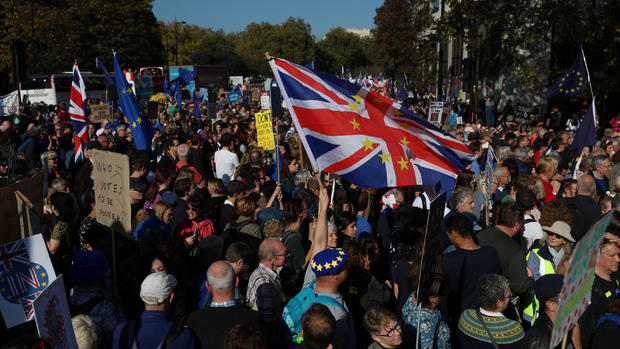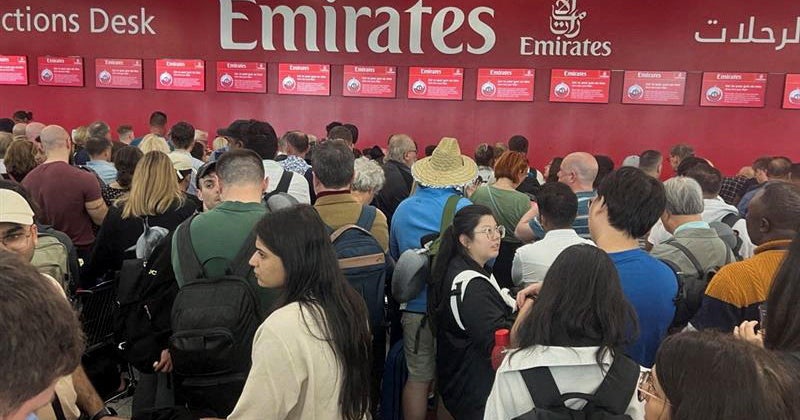Brexit vote: British Parliament emphatically rejects May's Brexit deal — now what?
London — Parliament rejected Prime Minister Theresa May's proposed divorce agreement with the European Union on Tuesday evening in a ballot dubbed the "Meaningful Vote." The name may be a nod to Britain's trademark sarcasm, as her plan was doomed to fail and the 66 million inhabitants of the British Isles will likely be left on Wednesday morning with little more understanding of how, when or even if they are leaving the EU.
May's deal was rejected by a vote of 432 to 202, a stinging gulf of more than 200 votes. Political analysts in Britain spent the day waxing philosophical about the number which would represent a "good" or "bad" defeat for Mrs. May. The final 230 vote difference is a strong signal from British lawmakers -- including many of those in her own party -- that they lack confidence in her ability to continue handling the Brexit process.
What happens next is far from clear. Mrs. May had made it clear she isn't prepared to throw in the towel, ruling out a resignation, no matter how stinging a defeat she's dealt.
Parliament was supposed to have voted on Mrs. May's unloved-by-anyone Brexit deal on Dec. 11, but her government delayed it, fearing certain defeat. She spent the month since then trying to pull concessions to sweeten her deal from the clenched fists of European negotiators. They gave very little, so on Monday she urged British lawmakers to reconsider her hard-won agreement and back it in Tuesday's vote.
But the clock is ticking louder than ever. The two-year pre-withdrawal period sparked by Britain's official request to leave the EU ends on March 29, in just 10 weeks. At that point, barring an upheaval in Parliament that reverses the process (see below), under EU rules, the United Kingdom will be out.
So what could happen next? Countless hours of television punditry, color-coded flow charts and miles of text have been devoted to reading those tea leaves. The short answer is, nobody knows yet. This is uncharted territory. No EU member has ever triggered Article 50 of the European Constitution — the withdrawal mechanism — before.
There are still at least five possible outcomes, and none of them are terribly straightforward:
May takes her deal back to Europe, again
If May remains steadfast in her commitment to the plan she hammered out with European negotiators in the wake of the 2016 public referendum — which she says is the best deal Britain can hope for — she will be forced by a defeat on Tuesday night to take that agreement back to Europe to seek more concessions.
The first time she did that, after the delayed vote in December, she managed to get some language finessed in the 500-page document, but the changes were largely cosmetic.
While a resounding "NO" from British lawmakers could convince the Europeans to give her a bit more, there's no indication they're prepared to significantly alter the key tenets of the divorce deal. So May would likely have to bring something that looks a lot like the same old deal back to Parliament for another try. If and when that happens, start reading this article again from the top.
If she wants to go back to the EU and try to completely renegotiate the deal she has been pushing in London, it would almost certainly require more than 10 weeks. If she wants that, she would have to ask the EU for an extension to the two-year period mandated under Article 50 of European law. All 27 other member states would need to agree to the delay, and even if they do, many pro-Brexit lawmakers and members of the British public would be outraged and see it as a betrayal of the public will.
May calls general election
As the leader of the government, Prime Minister May can call for an early general election in Britain. Two thirds of the lawmakers in the House of Commons would need to vote in favor for her request to be granted.
If it is, her government would have to schedule the election for at least 25 days later. If her Conservative Party wins, it would be a significant boost to May's mandate to hash out the divorce deal with Europe, and it would make her Conservative colleagues in Parliament less likely to rebel against her. That would, in theory, smooth the way for whatever final deal she eventually brings back from Brussels.
But she could lose the election. That would likely leave the opposition Labour Party to try and form a government to take over the Brexit negotiations. Labour's position, officially, is that the people's will, expressed in the 2016 referendum, must be respected and Brexit should happen.
It's unclear what sort of Brexit Labour's current leader Jeremy Corbyn would espouse, and a lot of his colleagues campaigned hard against leaving the EU and have called since for a "people's vote" — essentially a referendum do-over.
Any new election would also require the EU to accept an extension of the Article 50 period set to end on March 29.
May faces no-confidence vote
Prime Minister May has already survived a no-confidence vote among her Conservative colleagues, but now that her Brexit plan lost dramatically in Tuesday night's vote, she faces a bigger challenge.
After the vote on the Brexit deal, Corbyn called for a vote of no-confidence in May's government on Wednesday. The vote will be for all sitting Members of Parliament, from all parties.
If May's government wins the vote, she would carry on with her deal (resume from first option above).
If she loses, it would clear the way for a different lawmaker from her party or another to try and form a new government. Under U.K. law, that government — whether formed by a single party or a coalition — would need to survive a no-confidence vote within 14 days.
Before Monday's vote, it seemed unlikely that Corbyn would risk calling a vote of no-confidence, as there was not clear majority support for it among lawmakers of other parties.
Nothing happens: "No-deal" Brexit
If British lawmakers spend the next 10 weeks arguing the same points they have for the past two years and the impasse cannot be resolved, then on March 29, Britain will cease to be a member of the European Union it helped to build starting seven decades ago.
Without a deal in place with the EU, Britain's international trade will suddenly be governed only by broad World Trade Organization rules. Brexit advocates say this will liberate the country to negotiate new, unilateral deals with countries around the world.
"Remainers" argue, however, that while Britain was once a global superpower, it would struggle to achieve beneficial trade agreements unilaterally. Currently Britain's trade is negotiated as part of the EU bloc — the combined weight of which makes it the biggest economy in the world. The U.K. is the second-largest economy within the EU, after Germany.
There are also concerns that the sudden and dramatic change in customs and immigration law would cause massive backups at British ports, inhibiting the vital flow of food, medicine and people across the border.
Such concerns — dismissed as fear-mongering by ardent Brexiteers in May's own party — have been expressed by senior economists and the Governor of the Bank of England, farming and teaching unions and business leaders across the U.K.
"People's vote," or referendum 2.0
Prime Minister May could gamble on another referendum. The outcome of a second public vote with an option to remain in the EU is far from certain, and it would enrage many of the people in the U.K. who feel their vote two years ago should be respected.
If she were to call for a second referendum, as with most of the other options above, it would require a protracted process to approve the move in Parliament and then a separate legislative process to lay out how the vote would actually be held. And, of course, that all takes more than 10 weeks, so the EU would also need to grant an Article 50 extension.
If May calls for a second public vote but Parliament fails to approve the request, we start all over again at the top of this article, but with a lot less than 10 weeks on the clock.




